From patronising hierarchical superiors to casual, zero-hour contracts, to pension cuts, we are witnessing in many countries the entrenchment of a two-tier system of academia, with increasingly few tenured positions standing ‘above’ a growing host of temporary, uncertain teaching and research gigs.
The more optimistic take is that the #USSStrike — which has been carried out by colleagues in the UK with bravery and humour, despite rain, freezing temperatures, and insulting offers of compromise — will provide the impetus to reclaim our universities, and rethink and revolutionise higher education entirely.
However, Salvatore Poier’s moving call for solidarity with unemployed and precarious researchers reminds us that oppression and inequality are cross-cutting issues, and can fundamentally only be addressed as intersectional problems.
We thus close off this week with a call for reviewers for a handful of new enthographies both on new precarious worlds of work, and music’s transformative potential.
here are our review guidelines:
As we receive many requests for reviews, please write 2-3 sentences why you should be reviewing this book, indicating how it relates to your own research or interests.
Spelling: British English. Please use –ise and not –ize word endings.
Word limit: 750-1500 words.
Font: Times New Roman.
Size: 12.
Line Spacing: 1,5
No footnotes.
If you cite other authors, please reference their publication in the end.
The review is to be written within three months from the dispatch of the book.
When submitting the review, do not forget to include your name, (academic) affiliation, a photograph of yourself and a short bio of 2-3 sentences.
Please send your expression of interest to: reviews@allegralaboratory.net
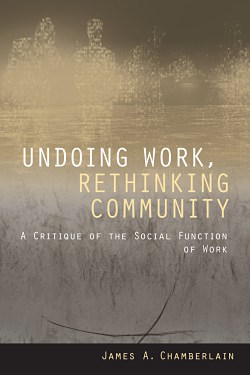
This revolutionary book presents a new conception of community and the struggle against capitalism. In Undoing Work, Rethinking Community, James A. Chamberlain argues that paid work and the civic duty to perform it substantially undermines freedom and justice. Chamberlain believes that to seize back our time and transform our society, we must abandon the deep-seated view that community is constructed by work, whether paid or not.
Chamberlain focuses on the regimes of flexibility and the unconditional basic income, arguing that while both offer prospects for greater freedom and justice, they also incur the risk of shoring up the work society rather than challenging it. To transform the work society, he shows that we must also reconfigure the place of paid work in our lives and rethink the meaning of community at a deeper level. Throughout, he speaks to a broad readership, and his focus on freedom and social justice will interest scholars and activists alike. Chamberlain offers a range of strategies that will allow us to uncouple our deepest human values from the notion that worth is generated only through labor.
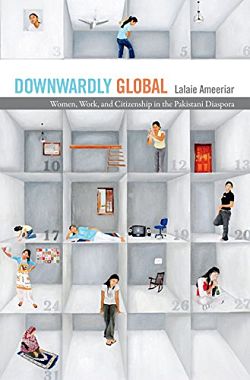
In Downwardly Global Lalaie Ameeriar examines the transnational labor migration of Pakistani women to Toronto. Despite being trained professionals in fields including engineering, law, medicine, and education, they experience high levels of unemployment and poverty. Rather than addressing this downward mobility as the result of bureaucratic failures, in practice their unemployment is treated as a problem of culture and racialized bodily difference. In Toronto, a city that prides itself on multicultural inclusion, women are subjected to two distinct cultural contexts revealing that integration in Canada represents not the erasure of all differences, but the celebration of some differences and the eradication of others. Downwardly Global juxtaposes the experiences of these women in state-funded unemployment workshops, where they are instructed not to smell like Indian food or wear ethnic clothing, with their experiences at cultural festivals in which they are encouraged to promote these same differences. This form of multiculturalism, Ameeriar reveals, privileges whiteness while using race, gender, and cultural difference as a scapegoat for the failures of Canadian neoliberal policies.
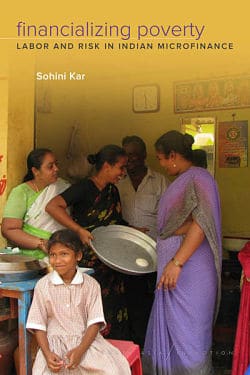
Microfinance is the business of giving small, collateral-free loans to poor borrowers that are paid back in frequent intervals with interest. While these for-profit microfinance institutions (MFIs) promise social and economic empowerment, they have mainly succeeded at enfolding the poor—especially women—into the vast circuits of global finance. Financializing Poverty ethnographically examines how the emergence of MFIs has allowed financial institutions in the city of Kolkata, India, to capitalize on the poverty of its residents.
This book reveals how MFIs have restructured debt relationships in new ways. On the one hand, they have opened access to new streams of credit. However, as the network of finance increasingly incorporates the poor, the “inclusive” dimensions of microfinance are continuously met with rigid forms of credit risk management that reproduce the very inequality the loans are meant to alleviate. Moreover, despite being collateral-free loans, the use of life insurance to manage the high mortality rates of poor borrowers has led to the collateralization of life itself. Thus the newfound ability of the poor to use MFI loans has entrapped them in a system dependent not only on their circulation of capital, but on the poverty that threatens their lives.

The coveted “Made in Italy” label calls to mind visions of nimble-fingered Italian tailors lovingly sewing elegant, high-end clothing. The phrase evokes a sense of authenticity, heritage, and rustic charm. Yet, as Elizabeth L. Krause uncovers in Tight Knit, Chinese migrants are the ones sewing “Made in Italy” labels into low-cost items for a thriving fast-fashion industry—all the while adding new patterns to the social fabric of Italy’s iconic fashion industry.
Krause offers a revelatory look into how families involved in the fashion industry are coping with globalization based on longterm research in Prato, the historic hub of textile production in the heart of metropolitan Tuscany. She brings to the fore the tensions—over value, money, beauty, family, care, and belonging—that are reaching a boiling point as the country struggles to deal with the same migration pressures that are triggering backlash all over Europe and North America. Tight Knit tells a fascinating story about the heterogeneity of contemporary capitalism that will interest social scientists, immigration experts, and anyone curious about how globalization is changing the most basic of human conditions—making a living and making a life.
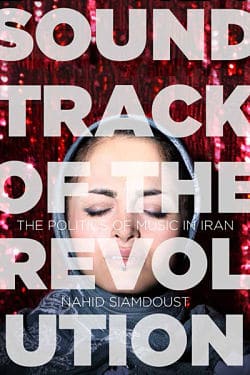
Music was one of the first casualties of the Iranian Revolution. It was banned in 1979, but it quickly crept back into Iranian culture and politics. The state made use of music for its propaganda during the Iran–Iraq war. Over time music provided an important political space where artists and audiences could engage in social and political debate. Now, more than thirty-five years on, both the children of the revolution and their music have come of age. Soundtrack of the Revolution offers a striking account of Iranian culture, politics, and social change to provide an alternative history of the Islamic Republic.
Drawing on over five years of research in Iran, including during the 2009 protests, Nahid Siamdoust introduces a full cast of characters, from musicians and audience members to state officials, and takes readers into concert halls and underground performances, as well as the state licensing and censorship offices. She closely follows the work of four musicians—a giant of Persian classical music, a government-supported pop star, a rebel rock-and-roller, and an underground rapper—each with markedly different political views and relations with the Iranian government. Taken together, these examinations of musicians and their music shed light on issues at the heart of debates in Iran—about its future and identity, changing notions of religious belief, and the quest for political freedom.
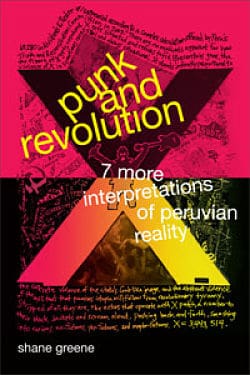
In Punk and Revolution Shane Greene radically uproots punk from its iconic place in First World urban culture, Anglo popular music, and the Euro-American avant-garde, situating it instead as a crucial element in Peru’s culture of subversive militancy and political violence. Inspired by José Carlos Mariátegui’s Seven Interpretive Essays on Peruvian Reality, Greene explores punk’s political aspirations and subcultural possibilities while complicating the dominant narratives of the war between the Shining Path and the Peruvian state. In these seven essays, Greene experiments with style and content, bends the ethnographic genre, and juxtaposes the textual and visual. He theorizes punk in Lima as a mode of aesthetic and material underproduction, rants at canonical cultural studies for its failure to acknowledge punk’s potential for generating revolutionary politics, and uncovers the intersections of gender, ethnicity, class, and authenticity in the Lima punk scene. Following the theoretical interventions of Debord, Benjamin, and Bakhtin, Greene fundamentally redefines how we might think about the creative contours of punk subculture and the politics of anarchist praxis.
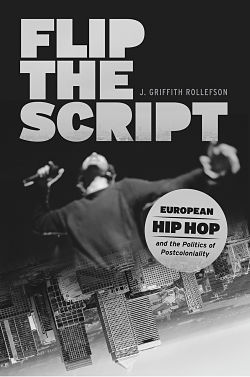
Hip hop has long been a vehicle for protest in the United States, used by its primarily African American creators to address issues of prejudice, repression, and exclusion. But the music is now a worldwide phenomenon, and outside the United States it has been taken up by those facing similar struggles. Flip the Script offers a close look at the role of hip hop in Europe, where it has become a politically powerful and commercially successful form of expression for the children and grandchildren of immigrants from former colonies.
Through analysis of recorded music and other media, as well as interviews and fieldwork with hip hop communities, J. Griffith Rollefson shows how this music created by black Americans is deployed by Senegalese Parisians, Turkish Berliners, and South Asian Londoners to both differentiate themselves from and relate themselves to the dominant culture. By listening closely to the ways these postcolonial citizens in Europe express their solidarity with African Americans through music, Rollefson shows, we can literally hear the hybrid realities of a global double consciousness.
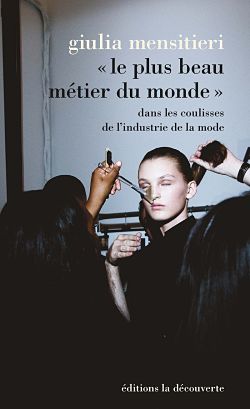
La mode est l’une des plus puissantes industries du monde : elle représente 6 % de la consommation mondiale et est en croissance constante. Depuis les années 1980 et l’entrée dans l’économie néolibérale, elle est devenue l’image étincelante du capitalisme, combinant prestige, pouvoir et beauté, et occupe une place centrale dans les médias et les imaginaires. Pourtant, cette industrie, qui apparaît comme un horizon professionnel hautement désirable, repose principalement sur du travail précaire, et ce aussi bien là où la production est externalisée qu’au coeur de la production créative du luxe, comme les prestigieux ateliers des maisons de couture.
À partir d’une enquête en immersion auprès des travailleurs créatifs de cette industrie (stylistes, mannequins, créateurs indépendants, coiffeurs, maquilleurs, vendeurs, journalistes, retoucheurs, stagiaires, agents commerciaux, etc.), ce livre dévoile la réalité du travail à l’oeuvre derrière la façade glamour de la mode. Il met notamment en lumière les dynamiques d’exploitation et d’autoexploitation ainsi que le prestige social liés au fait de travailler dans un milieu désirable.
Des séances de « shooting » pour magazines spécialisés à la collaboration auprès d’un créateur de mode, en passant par des entretiens avec des stylistes travaillant pour de célèbres maisons de luxe et de couture, cette enquête dévoile une nouvelle forme de précarité caractéristique des industries culturelles du capitalisme contemporain, une précarité combinée au prestige, à la reconnaissance et à la visibilité. Il s’agit ainsi de décrypter les dynamiques invisibles sur lesquelles repose l’industrie de la mode pour mieux la «déglamouriser ».
Featured image by Oleg Laptev (www.unsplash.com)



